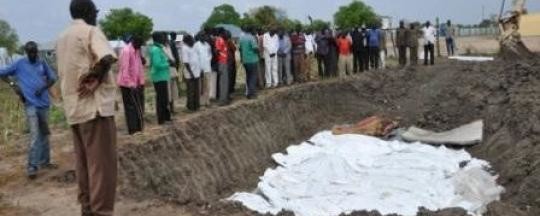A coalition of South Sudanese law and civil society groups has presented guidelines for achieving transitional justice in South Sudan, including the establishment of a hybrid court.
Transitional justice promotes both reconciliation and accountability to help societies in conflict or emerging from conflict prevent a repeat of violence. This form of justice has been implemented in South Africa after Apartheid and other countries.
The guidelines for South Sudan, linked for download below and titled “Transitional Justice Strategy for South Sudan,” emerged from an August 2014 conference held in Nairobi that included more than 60 national and international participants.
Drawing on IGAD documents, the guidelines recommend transitional justice be achieved through three independent groups: a reconciliation and healing commission, a truth commission, and a hybrid court composed of South Sudanese and foreign judges.
“The establishment of these institutions would be an important first step for South Sudan in coming to terms with the legacy of human rights violations in the country,” the report reads.
Two independent commissions
The report recommends setting up two separate commissions, one for healing and one for truth telling, so that no single commission is overburdened.
The healing commission would promote reconciliation between communities. The report recommends the independence of this commission, citing previous attempts at reconciliation that fell apart due to political interference.
The truth commission, meanwhile, would document human rights abuses committed by both state and non-state actors dating to 1972, when southerners first gained a regional government. It would publish names of victims and perpetrators, and gather victims’ experiences to help communities come to terms with violence committed against them.
“The body should also be empowered to name perpetrators and to make recommendations for promoting criminal accountability in its final report,” the strategy reads.
The report recommends barring anyone with poor human rights records from serving on the truth commission. It also recommends giving the commission power of subpoena to compel testimony from suspected individuals, and the power to search and seize documents and other evidence related to human rights violations.
A hybrid court
The hybrid court separate from South Sudan’s judiciary would be responsible for investigating and prosecuting people accused of committing human rights violations, genocide, and crimes against humanity since the beginning of the civil war in December 2013.
The report adds that to ensure an end to impunity, South Sudan’s expected transitional government should ratify the Rome Statute to make the nation a member of the International Criminal Court (ICC). That way, the ICC can intervene in case South Sudanese leaders block the hybrid court from doing its job.
“Any peace agreement that comes out of the peace talks should require the transitional government to ratify the Rome Statute,” the report reads. “By ratifying the Rome Statute, the transitional government could send a powerful signal to the people of South Sudan that it is committed to building a culture of respect for human rights and rule of law.”
“If any of the parties undermines efforts to establish the hybrid court, or if the transitional legislative assembly fails to enact legislation for the hybrid court within the specified time period, the transitional government should be required to request the ICC to investigate and bring cases against those that bear greatest responsibility for international crimes committed in South Sudan since 15 December 2013.”
South Sudan, like Sudan whose president Omar al-Bashir is indicted by the Hague-based court for genocide crimes, is not an ICC member.
File photo: mass grave in Bor




